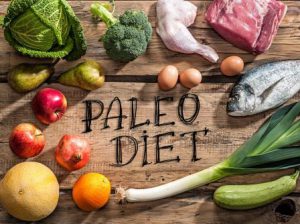By Jen Johnston, CHHC, senior marketing services account manager, for the Step into Natural blog series
We’ve talked about lifestyle diets before and how they factor into a “natural lifestyle” for many people. The number of different lifestyle diets is vast, and one that has stuck around longer than many imagined is the Paleolithic or “paleo” diet.
With a paleo diet, the idea is to only eat the types of food that would have been found before the agricultural revolution. According to Wikipedia, the diet typically “includes vegetables, fruits, nuts, roots, and meat and typically excludes foods such as dairy products, grains, sugar, legumes, processed oils, salt, alcohol, or coffee.” However, some followers include “natural” sugars such as maple syrup and coconut sugar and sometimes even certain dairy products and coffee. (For example, the popular Bulletproof® coffee often appeals to the paleo crowd, though it is technically not paleo.)
At its heart, paleo is a grain-free diet. There are lots of variations on grain-free diets which range from The Whole 30® to Primal and from Ancestral to Wheat Belly. Grain-free consumers are fueling the growth. Food Navigator reported that “the natural channel may have the largest share of Paleo-positioned products, with US retail sales up 123.4% to $76.8m in the year to May 21, but the conventional channel experienced the most growth, with sales up 218% to $55.8m over the same period.”
Health coach Cortney Chaite explained on the leading natural products industry online publication, NewHope.com, that “the people who eat and love the paleo lifestyle, really love paleo because it has also somehow changed their life. People have lost weight, improved chronic illness, and increased their energy and stamina.”
Many that follow these paleo or ancestral diets care about eating locally, eating sustainably, and eating seasonally. People that follow paleo might be interested in going to farmer’s markets, gardening, beekeeping, organic food, and other things that appeal to a more “natural” lifestyle.
Paleo cookbook authors, online medical personalities, and bloggers have all contributed to the widespread success of this diet. Here are a few of them:
- Danielle Walker, author of Against all Grain keeps a robust web presence. She healed her autoimmune disease at age 22 through adopting a paleo lifestyle.
- Chris Kresser, M.S., L.Ac is a globally recognized leader in the fields of ancestral health, Paleo nutrition, and functional and integrative medicine. He is the creator of ChrisKresser.com, one of the top 25 natural health sites in the world, and the author of the New York Times best seller, Your Personal Paleo Code.
- Sarah Ballantyne, PhD., is a biophysicist and mom that started the award-winning website ThePaleoMom.com which features detailed articles distilling the science behind how diet and lifestyle impact health.
So how do paleo diets affect pharmacies that don’t also sell food? Well, many adopters of the diet apply the principles to all areas of their life, including their OTCs and personal care products. Savvy brands have jumped at the opportunity, marketing their products specifically to the paleo crowd.

For example, there is a brand that I’ve mentioned on the blog before called The Dirt® which offers a coconut oil toothpaste and a trace mineral tooth brushing powder. They brand themselves as paleo because they don’t contain any ingredients that would go against a paleo diet. (Coincidentally, it is also a vegan product!)
Then there is the slew of supplements that paleo diet adopters tend to take. Online influencers like Chris Kresser are recommending supplements such as these:
- Vitamin A
- Vitamin D
- Vitamin K2
- Magnesium
- Vitamin C
Other influencers also recommend:
- DHA/EPA
- Minerals: iodine, iron, and selenium
- CoQ10
- Multivitamin
- DHEA/melatonin
Paleo customers may also be more likely to look for personal care products that are considered “clean label” or are free from certain chemicals. Are you carrying these types of products that appeal to your paleo shoppers? Are they easy to locate through signage or other wayfinding? Does your health publications section contain any books or magazines that appeal to this audience, such as Paleo Magazine or The Primal Blueprint by Mark Sisson? Do you carry paleo-approved snacks such as EPIC® meat bars, snack strips or pork skins and EXO® cricket flour protein bars? (Yes, I said cricket powder – and yes, it is what it sounds like.) Could you include a paleo health coach at your next in-store health fair or bring in an integrative doctor to give a presentation on what products are appropriate for a paleo lifestyle?
These are just a few of the opportunities to connect with your paleo shoppers. Remember, they are choosing to eat this way because they want to be healthy, and you also want your patients to be healthy – the goal is the same. Meet them where they are; get creative. You never know what kind of opportunities await when you connect with shoppers through their lifestyle diet.